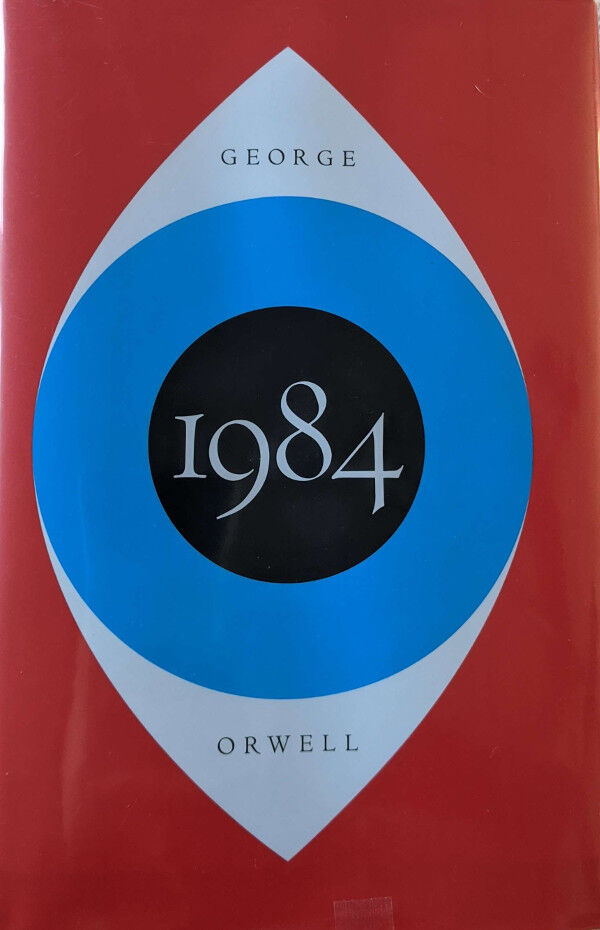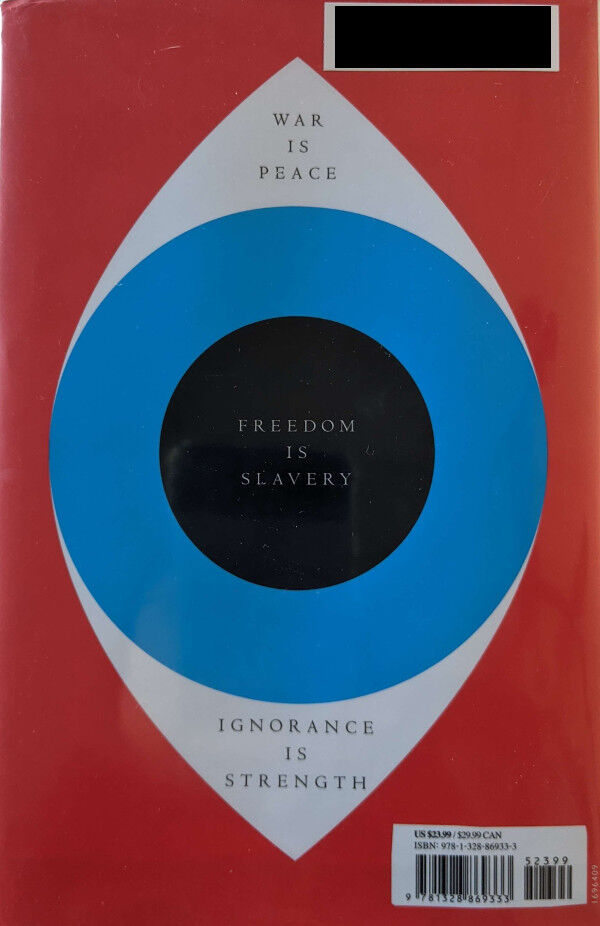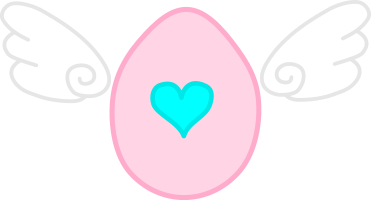1984
War is Peace, Slavery is Freedom

Author: Orwell, George
Year first published: 1949
Original Language: English
Genre: Dystopian, Political Fiction
I didn’t go to middle or highschool in north america, so I was never required to read…well anything to be honest. We didn’t read much at our school. Our library was pathetic. It made me really sad, because for a large chunk of my adolescence all I could get ahold of were Harlequin Romance novels and the like.
But that’s neither here nor there.
I’d never read this book before, and knew little about it other than what I’ve learned through cultural osmosis. The striking cover caught my eye while I was wandering around, so I thought, hey, why not?
I actually had borrowed this back in late October, hoping for something actually frightening just in case the horror novel I had chosen didn’t pan out (it did not, in fact, pan out. It was pretty awful. See what I had to say about it here).
It starts a bit slow, and our protagonist is a major asshole. There’s no other way to put it. He’s petty and distrustful, as designed by those in Big Brother’s Party. He’s a horribly messed up person from the society he’s in, including being a massive misogynist that fantasizes about raping and murdering a girl at his workplace just for existing and being a woman, because the Party has engineered all affection out of relationships and members are not even allowed to feel romantic love. In fact, simply being attracted to someone is a red flag that could get you vaporized. This is all to set up just how absolutely awful the world is.
This is a setting where even medieval peasants objectively had a beftter life. A world where art, culture, and language are destroyed, leaving only sanitized, Party Approved Entertainment created by their Fiction Machines and other departments churning out sounds and stories with no human feeling, input, or passion.
This is a world where passion has been taken out back and shot.
Honestly, the main slogan people associate with the book, “Big Brother is Watching,” is not actually expressed that often. There are in fact many places where Big Brother’s eyes don’t reach. Though to be frank, in the current state of the world in 2023, much of this book hits way too close to home, with the constant surveilance seeming less terrifying than everything else because constant surveillance is actually a reality that happens. We have smartphones and tablets with microphones, there’s ways to remote access your webcam if you have one (i tend to cover the ones on my laptops with stickers). And it is terrifying, yes, I’ve no doubt smartphones would absolutely horrify Orwell. I think a lot of the world would actually. North Korea is about as close to 1984’s Oceania as you can get.
There's even some things currently happening that are even more horrendous than anything Orwell could conceive of.
The fiction machines made me viscerally recoil. A similar thing is being developed with current technology. As of current day, there are several AI programs for generating images and text based on questions or prompts, trained on data acquired often without the IP owner’s permission or consent, and many people are using that right now as a way to make money with no effort. People make AI written books which are just a basic smattering of words with no real soul and very often, no continuity, as these text generators are incapable of remembering context. AI “art” that simply mashes other peoples’ stolen work together in anatomically incorrect and sometimes hilarious ways, with people loudly and proudly defending it by performatively pretending to care about disabled people. There’s even AI music. Automating the fun and satisfying parts of creation is a travesty.
Humans will always yearn for enjoyment, entertainment, and art. It’s in our nature as intelligent beings to seek our stimulus, and in our nature as communal creatures to gravitate to stories. Stories are one of humanity’s greatest evolutionary advantages, as it allows us to pass on exacting and complex knowledge with precision and ease. Not being able to pass on any of our knowledge or wisdom, being force fed manufactured words about a false reality. We’ve devised numerous writing systems, musical notation, mathematical formulas, all of which forming a shared human existence of knowledge.
It’s interesting reading an older dystopic novel. A lot of conventions and tropes have changed over the decades. Everything being pretty horrible by design is still a standard trope, but a lot of modern dystopia stories are about places pretending to be Eutopias, stories where things look amazing on the surface until you dig. 1984 has no such front. Granted, the story is seen from the perspective of the complicit cogs that keep the system functioning. Our main characters are the people working behind the scenes to make sure the masses don’t realize their reality is completely manufactured. Everything from the media they consume to the things that are allowed to even exist is highly curated. Even the economy is steered by Big Brother’s guiding hand.
Even the poverty is manufactured, shown by the fact that the world powers by design destroyed goods to create scarcity and make everyone more impoverished on purpose. The horrors of war are fabricated and exaggerated, with people taught that their enemy is a horrific amoral monster despite the three major prevailing essentially being exactly the same. But that's a tactic used by humanity since war was first conceived. After all, it’s not wrong to kill them if they aren’t even human, right? It is a grim reality still perpetuated today. We put these things in fiction and refuse to believe that this could be real because it's horrifying to think about.
One of the things that unsettled me the most was the very concept of Newspeak. Now, slang and the evolution of word meanings isn’t new, and in fact conlang can be quite interesting and add some flavor to your work, but while in a newer dystopian novel, Newspeak might be a language formed by the people or some underground network as a code to communicate, it instead is something far more sinister: a new language developed by the government, forced upon the people, created and designed specifically to limit the ideas that can even form in someone’s head, as they no longer even have the words for it. Why have the word bad when ungood works just as well?
The included essay about Newspeak was also quite fun to read, and I’m glad it was a separate section rather than included as a part of the narrative story. I later learned through some digging that many people consider this to be an important element to the story, pointing to the use of past tense to indicate that by the time it was written, the Brotherhood had fallen. It’s a neat take!
The “romance” in the story is one of the main driving plots, and its really funny watching people awkwardly trying to court each other while living in a society that discourages people of the opposite sex from even talking to each other. It’s also pretty depressing how they have to go about it, discreetly planning details of how to go somewhere to meet up for a secret rendezvous while they’re standing in a loud crowd for two minutes before parting ways and pretending they have never spoken in their lives.
I gotta admit, I found “The Took,” the literature that the rebels used for education, to be the most boring parts of the book. I get that it's world building and giving context to exactly what's different from our world, but my lord was it a chore to slog through. I ended up just skipping half way through just to get on with the story, and I'm quite glad I did, to be honest. Because the part right after struck me quite a bit.
Winston starts off as frankly a terrible person, shaped by the terribleness of his society. And here, watching this woman labor with her laundry, seeing her for the human being she is, wondering about her life story, he calls her beautiful. Julia, in her youth and ignorance can't see past the stocky woman's appearance and weight, but Winston, in spite of how jaded and hateful he is, sees her life, her worth, the powerful beauty of her resilience.
Eventually, it all comes crashing down. It had to, at some point. Winston’s late book argument with O’Brien was exactly like reading a debate from a real like, off their rocker republican. The sheer dedication to the delusion is just astounding.
It all ends on a bleak note. Julia and Winston took comfort in each other but shared no real love. The world continues to turn and Big Brother continues to watch, while Winston is now a shell of himself, a thoroughly broken man.
This is not a book that was written to be enjoyed. This was a grim look into a horrifying future that one man saw and shared with the world, likely hoping it would never come to pass. And yet in some ways I almost wonder if the present we live in, the future Orwell never lived to see, is worse than the hellscape he imagined. We are as dead inside as those broken down by the party, and many are just letting it happen. We're all tired. It's so hard to just continue sometimes.
This was a book written to spark action and thought, to remind those who read it not to give in. This book is a warning, and I'm not sure the generations after Orwell have taken it to heart.
A lot of this book, contrasted with modern 21st century history that has happened since this book was published…almost doesn't even feel like fiction. We know our governments spy on us 24/7. We know that the American government has strategically sabotaged and dismantled small governments through history, pushing those countries deep into poverty that they still struggle to crawl out of, and continues to do so. One of our two major political parties built their whole voter base on keeping people down, stripping away rights, and clutching their pearls while they cry and wail about degeneracy and how gay and trans people are “ruining this country,” a party that in no unclear terms wants people like me and many of my friends to simply disappear or die. There’s been active wars and terrorism going on since I was a child, and there are some still happening today. There’s genocides being performed.
But we’re still here, still human. Still alive and daring to hope.
Big Brother can’t last forever.

Review posted 2023/12/23
